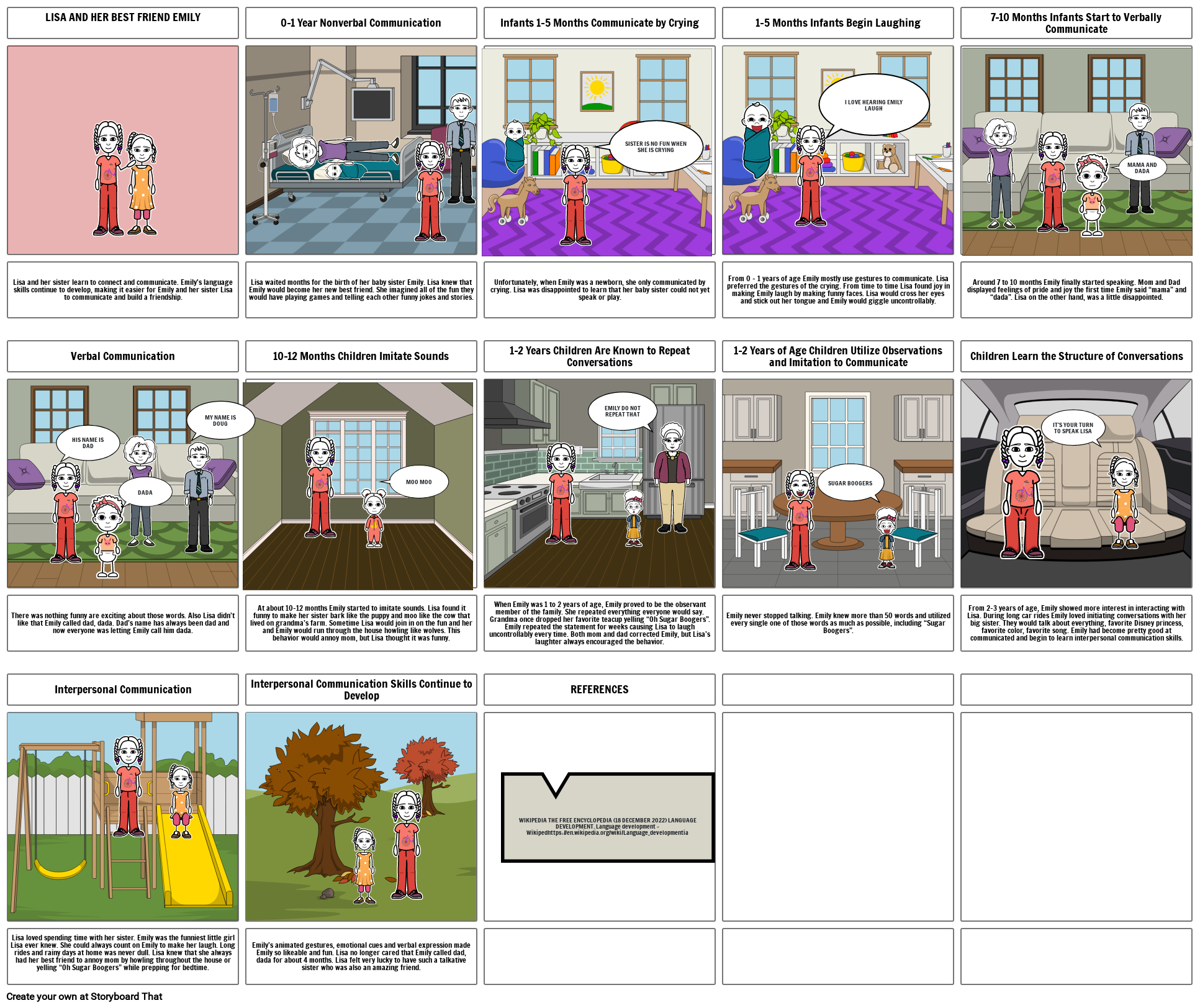LISA AND HER BEST FRIEND EMILY

Kuvakäsikirjoitus Teksti
- Lisa's Best Friend
- 0-1 Year Nonverbal Communication
- Infants 1-5 Months Communicate by Crying
- 1-5 Months Infants Begin Laughing
- 7-10 Months Infants Start to Verbally Communicate
- Lisa and her sister learn to connect and communicate. Emily's language skills continue to develop, making it easier for Emily and her sister Lisa to communicate and build a friendship.
- Verbal Communication
- Lisa waited months for the birth of her baby sister Emily. Lisa knew that Emily would become her new best friend. She imagined all of the fun they would have playing games and telling each other funny jokes and stories.
- 10-12 Months Children Imitate Sounds
- Unfortunately, when Emily was a newborn, she only communicated by crying. Lisa was disappointed to learn that her baby sister could not yet speak or play.
- 1-2 Years Children Are Known to Repeat Conversations
- From 0 – 1 years of age Emily mostly use gestures to communicate. Lisa preferred the gestures of the crying. From time to time Lisa found joy in making Emily laugh by making funny faces. Lisa would cross her eyes and stick out her tongue and Emily would giggle uncontrollably.
- 1-2 Years of Age Children Utilize Observations and Imitation to Communicate
- Around 7 to 10 months Emily finally started speaking. Mom and Dad displayed feelings of pride and joy the first time Emily said “mama” and “dada”. Lisa on the other hand, was a little disappointed.
- Children Learn the Structure of Conversations
- There was nothing funny are exciting about those words. Also Lisa didn’t like that Emily called dad, dada. Dad’s name has always been dad and now everyone was letting Emily call him dada.
- At about 10-12 months Emily started to imitate sounds. Lisa found it funny to make her sister bark like the puppy and moo like the cow that lived on grandma’s farm. Sometime Lisa would join in on the fun and her and Emily would run through the house howling like wolves. This behavior would annoy mom, but Lisa thought it was funny.
- When Emily was 1 to 2 years of age, Emily proved to be the observant member of the family. She repeated everything everyone would say. Grandma once dropped her favorite teacup yelling “Oh Sugar Boogers”. Emily repeated the statement for weeks causing Lisa to laugh uncontrollably every time. Both mom and dad corrected Emily, but Lisa’s laughter always encouraged the behavior.
- Emily never stopped talking. Emily knew more than 50 words and utilized every single one of those words as much as possible, including “Sugar Boogers”.
- From 2-3 years of age, Emily showed more interest in interacting with Lisa. During long car rides Emily loved initiating conversations with her big sister. They would talk about everything, favorite Disney princess, favorite color, favorite song. Emily had become pretty good at communicated and begin to learn interpersonal communication skills.
- Interpersonal Communication
- Interpersonal Communication Skills Continue to Develop
- Lisa loved spending time with her sister. Emily was the funniest little girl Lisa ever knew. She could always count on Emily to make her laugh. Long rides and rainy days at home was never dull. Lisa knew that she always had her best friend to annoy mom by howling throughout the house or yelling “Oh Sugar Boogers” while prepping for bedtime.
- Emily’s animated gestures, emotional cues and verbal expression made Emily so likeable and fun. Lisa no longer cared that Emily called dad, dada for about 4 months. Lisa felt very lucky to have such a talkative sister who was also an amazing friend.
Yli 30 miljoonaa kuvakäsikirjoitusta luotu

